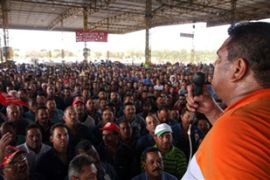Venezuela nationalises steel firm
Argentinian-Italian company latest to be taken into state hands.

Published On 10 Apr 2008
Ramon Carrizalez, the Venezuelan vice-president, said the nationalisation was meant to protect workers’ rights and complained that the company showed “great arrogance” in talks with unions.
“The president has instructed me to inform the company that the government is taking control of the business,” Carrizalez said.
But he said the firm would be compensated and could even stay on as a minority partner.
He said the government tried to help Sidor and the workers reach a solution, but “there was no will on the company’s part to settle the conflict”.
He accused the firm of showing more concern for its plant machinery than its workers.
Workers at Sidor’s steel complex about 500km southeast of Caracas said they welcomed the news after months of short strikes in the drawn-out dispute.
Jose Rodriguez, a workers leader at Sidor, said “it was high time the state got Sidor back from the claws of this miserable multinational”.
Company offer
Hugo Chavez, the Venezuelan president, announced plans to nationalise major cement companies last week as part of what he says are plans to build a socialist economy.
Last year’s nationalisations targeted US and European oil companies but the latest wave has also included companies from Latin America.
In a letter apparently written before the announcement, Paolo Rocca, the president of Ternium’s parent company Techint, urged Chavez to help find a solution, saying the company had agreed to increase salaries and pension payments and hire 600 contractors as full employees.
“We advance this proposal to make possible an agreement, in spite of Sidor’s financial limitations,” Rocca said.
Ternium’s shares fell 10.37 per cent to $34.67 on Wednesday.
The New York-listed company with a market capitalisation of about $7.7bn had annual sales of $2.4bn in Venezuela, according to Ricardo Prosperi, the company’s president.
Source: News Agencies